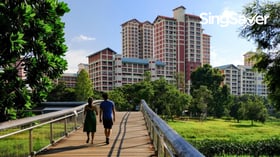With the rising inflation, property prices have been at an all-time high. Find out how Executive Condominiums (EC) fit into this climate of inflation and whether or not they are worth your investment.
In recent years, inflation has been on the rise. This has especially affected the property market, making the prices surge to all-time highs. Resale prices for HDB flats have been rising for the 23rd consecutive month, while estates like Woodlands and Pasir Ris witnessed their first million-dollar flats.
Because of this, the government recently launched cooling measures in December 2021 to curb the inflated property prices, and a number of changes in housing policy and criteria, like the introduction of the new Prime Location Housing (PLH) model. This is why buyers have to be even more vigilant when it comes to making purchasing decisions.
If you’re planning to upgrade your home or buy a second property as an investment, is an EC still a viable option? Here are five reasons why choosing an EC over a private condo might be a better choice in this climate of inflation.
Related to this topic:
Guide To Executive Condominiums (EC) In Singapore
Who Should Buy an Executive Condominium (EC)?
How Much Do You Need To Buy Your First Home In Singapore?
1. They are still cheaper than private property
Despite inflation and rising costs in the property market, it is a fact that ECs are still cheaper than private property, often up to 20% less than private condos.
On top of that, if you purchase an EC, you are eligible for government subsidies that will lower your purchase price.
Under the Family Grant for ECs, you can get up to S$30,000 if you and your spouse are both Singapore Citizens and earn a combined gross monthly household income of S$10,000 and lower, provided you two are both first-timer applicants. If one of you is a second-timer applicant, you’ll be eligible for the Half-Housing Grant of up to S$15,000 for the same household income tier.
| Average gross monthly household income | Family Grant — both Singapore Citizens | Family Grant — Singapore Citizen/Singapore Permanent Resident household | Half Housing Grant — one first-timer and one second-timer |
| S$10,000 or lower | S$30,000 | S$20,000 | S$15,000 |
| S$10,001 - S$11,000 | S$20,000 | S$10,000 | S$10,000 |
| S$11,001 - S$12,000 | S$10,000 | NIL | S$5,000 |
In this period of inflation where homebuyers have reduced purchasing power, choosing an EC over a condo might be a more ideal choice.
Related to this topic:
Complete Guide To HDB Grants: How Much Can You Get?
6 Misconceptions About Using Your CPF For Housing
2. They are less affected by cooling measures
As of December 2021, the government introduced cooling measures to curb the rising prices of all property types, including higher Additional Buyer’s Stamp Duty (ABSD), tightened Total Debt Servicing Ratio (TDSR) and a lower Loan To Value (LTV) limit. Out of which, ECs are particularly less affected by the higher ABSD imposed. Here’s why.
When a homebuyer chooses to upgrade their home to a condo, they will now have to pay 17% ABSD on the second property compared to the previous 12% if they choose to buy a unit before selling their HDB flat. If they sell their HDB flat within six months, they will be able to apply for reimbursement from their CPF and an ABSD remission later on, though the stamp duty has to be paid first.
However, for an EC, there is no ABSD needed, though they still have to sell their existing flat within six months. This makes it a much more financially prudent option as they won’t have to fork out a huge sum just to pay for the ABSD upfront, and can channel the money towards the purchase price of their EC.
Homebuyers who choose to buy a new launch condo can at least deduct the upfront ABSD from their CPF instead of using cash. However, this still temporarily uses up their CPF funds, and because they are more expensive than ECs, the upfront ABSD will still be a significant sum.
Looking for a home? Compare the best home loan rates in Singapore.
3. They are believed to appreciate faster than condos
There is the old-age theory that ECs appreciate faster than condos because of the initial lower prices and availability of government subsidies that give them room to appreciate. While this is sometimes true, it really depends on the development.
There have been many cases of private condos outperforming ECs and vice versa, so there isn’t really a guaranteed outcome. The price you purchase at, the price you sell at and timing the market are all crucial factors to determine your profits as well.
However, according to OrangeTee, the prices of ECs can eventually catch up with private condos after the Minimum Occupancy period (MOP), and even more so after the 10th year when it becomes fully privatised. They start off with an average 20% price gap, and then narrow to 9% and 5% respectively at MOP and at privatisation. It can then be sold to the open market to Singaporeans, PRs, foreigners and private companies upon privatisation.
4. They are generally more sellable after MOP than at privatisation
An older investment approach when it comes to ECs would be to sell it right when it gets privatised on the 10th year after purchase. However, investors recently realise that there may be a change in the investment strategy because of the implementation of the new cooling measures — and to sell it after MOP instead.
This is because if you sell after privatisation, you can access a bigger pool of buyers that includes foreigners or a company. However, with the rise in ABSD for foreigners and companies that have to now pay 30% from 20% for the second property and 35% from 25% on any property respectively, ECs might be less appealing to them.
If they are affluent enough to afford the rise in ABSD and not be impacted too greatly, they are more likely to look at high-end luxury condos. Additionally, developers and companies who previously purchased ECs for en bloc may also be less inclined to purchase ECs due to their reduced prospects after the increase in ABSD.
Because of this, the best time to sell might be right after MOP. However, owning an EC still gives you an option on when you want to sell, according to market conditions, making EC still a viable investment option despite inflation.
Buying a home soon? Don’t forget about protecting your home with the best home insurance plans in Singapore.
5. Their locations are now more accessible
ECs are believed to be located at more ‘ulu’ places where transport and amenities can be rather inaccessible, in a bid to keep the flats more affordable by building them in suburban areas.
However, in recent years, regional centres are being built in suburban districts to decentralise certain key industries away from Singapore’s Central Business District and to make workplaces nearer to where people live. In an attempt to do so, under the Land Transport Master Plan, LTA aims to make 80% of households live within a 10-minute walk to an MRT station by 2030.
A wide range of amenities has now also been developed all around Singapore, like shopping malls, schools, hospitals and recreational facilities. In fact, North Gaia, an EC launched in April 2022 in Yishun is right next to Khatib Bongsu Nature Park, making it relatively convenient for recreational activities.
As such, the demand for ECs may continue to increase from now on, since accessibility is now much better compared to the past.
Similar articles
What Happens If: My Partner And I Exceed The HDB BTO Income Ceiling?
Clearing Up the Confusion on New Property Measures in Singapore
2023 Guide To Executive Condominiums (EC) In Singapore
Why a BTO Flat Makes More Sense Than an EC (Even If You Can Afford It)
Rising Trend of Co-Living Among Millennials in Singapore: Survey
BTO Vs Resale Vs EC: Which Gives The Best Bang For Your Buck For Investment?
The Pros And Cons Of Purchasing Landed Property And Condo For Investment
Who Should Buy an Executive Condominium?










